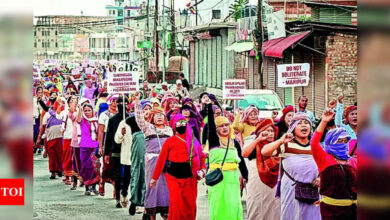India
Caste labor and limited food: Dalits talk about prison horror | India News – Times of India



But now, Dalits There is hope for better treatment in India’s prisons after the Supreme Court on October 3 delivered a landmark ruling striking down a series of “colonial-era” rules contained in prison manuals across the country that ” reinforced the caste-based division of labor, particularly targeting marginalized communities’.
Kunwar said, “Officials first inquire about a prisoner’s caste and note it down along with other personal details. The information about a person’s caste is then distributed throughout the prison and on that basis a detainee is assigned ‘work’. Dalits are mainly responsible for cleaning and sweeping. If anyone refuses, he is beaten up by other prisoners on the instructions of the prison management.” For Hapur resident Inder Pal, 43, it was even worse. “I got 67 days in jail. It felt like 67 years to me. I saw prisoners being forced to do low-quality work that they had never done before in their lives. We were all criminals. But some were considered superior. I had to sweep for two weeks. When I got sick and couldn’t work, I was told to clean the toilets. Without brush. I was asked to use a cloth or my bare hands.”
The inequality extended beyond just work. Monu Kashyap, 23, who spent seven days in a UP jail for possessing an illegal weapon, said, “Food was limited for prisoners belonging to the so-called lower castes, while others ate freely. Complaints were answered with threats or abuse.” Ram Bahadur Singh, 38, who was also in a UP jail, added that Dalit prisoners were often told to form a separate queue for food.
The apex court’s verdict heralds a long-awaited dawn of justice, says UP DGP
It’s like we’re feeding on the leftovers… like animals,” he said.
The recent Supreme Court ruling has also led to optimism within the ranks of the police. UP DGP Prashant Kumar, who welcomed the decision, told TOI, “It is a bold step towards restoring the dignity of labor in Indian prisons. The verdict heralds a long-awaited dawn of justice. For centuries, caste and occupation have been wrongly conflated, reducing entire communities to a life of subjugation and humiliation.”
UP’s top cop added, “With this ruling, enshrined in Article 21, the court calls for an end to the chains of caste-driven prison labor and urges reforms that promote equality.”
Several social activists praised the ruling. Satish Prakash, a Dalit activist and associate professor at Meerut College, said changing prison manuals is just the beginning. “The real problem is the mentality. In a caste-ridden society, dominance persists both inside and outside the prison. Social engineering is a must,” said Prakash. Kishore Kumar, a lawyer and Dalit activist from the NCR, added: “For prison guards, the term ‘Dalit’ is inextricably linked to what they call ‘hereditary occupations’ such as manual scavenging, sweeping and cleaning….”
However, some prison authorities TOI spoke to said “bias” was not allowed in their jails. Dadhiram Maurya, DIG (Prison), Uttarakhand, said, “There is no caste-based division of labor in our prisons. It was discontinued per our new prison manual last November.”
Additional District Judge Shehzad Ali, secretary of District Legal Services Authority, Bulandshahr, meanwhile said the SC ruling will strengthen the hands of lawyers and activists to ensure compliance. “We have regularly visited prisons to handle complaints. Now we will ensure strict compliance and take immediate action against violations,” Ali added.




